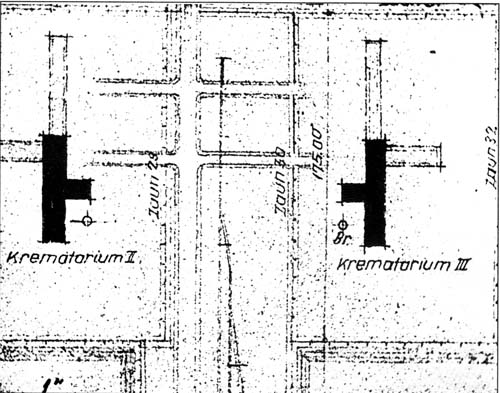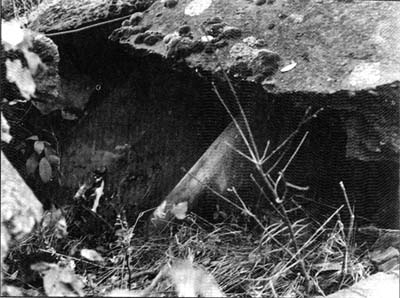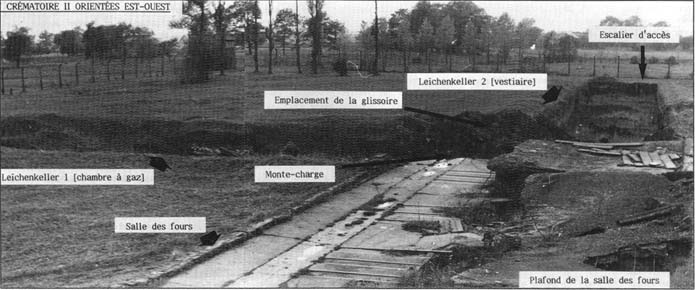|
|
 |
 |
AUSCHWITZ:
Technique
and Operation
of
the Gas Chambers © | |
|
| |
 |
Back |
 |
Contents |
Page 545 |
 |
Home
Page |
Forward |
 |
| |
| But I still wanted to see everything. The plan of Krematorium IV
[drawing 2036 of 11/1 /43, correction sheet to 1678] arrived before
me. Again I felt slight doubts about the logical sequence of
operations [justified doubts, for Krematorien IV and V underwent so
many modifications that their functioning became an “industrial”
farce]. I called Iwaszko, who reassured me. Rapidly. And being too
much of a neophyte to stand up to a “specialist” [for that is what
he was in my eyes]. I accepted his explanation. Meekly enough, but
still with inner reservations about the destructive capacity of the
four installations. |
| |
[Which is perfectly acceptable as far as the curator
of the Museum, Kasimierz Smolen is concerned, or so he told me
later, provided, of course, that proof can be produced. On the
other hand, the existence of the gas chambers cannot be called
into question. I listened to this and said nothing. Despite this
dangerous lack of psychology, no doubt involuntary on the part of
a former prisoner, my opinion came to be established otherwise,
freely, partly thanks to the understanding of Tadeusz Iwaszko who,
during my later visits, refused me nothing, acceding to my
requests whether they were justified or
not]. |
| The number of victims destroyed by the “mills” of Auschwitz,
originally stated to be 4 million, is now considered to be between 1
and 1.5 million. |
| |
| [Raul Hilberg, Professor in the Political Science Department of
the University of Vermont, calculated the number of Jews sent to
Auschwitz from the number of trains heading there, crosschecking
with the count of the number of wagons arriving as recorded by the
resistance organizations. The number of Jews arriving amounted to
between 1.05 and 1.1 million. Georges Welters, in his study
published in “Le Monde Juif” No. 112 (1983) entitled
“Essai de détermination du nombre de morts du camp
d’Auschwitz” arrives at a total of 1,471,595 dead, of whom
1,334,000 gassed. For my part, I obtained a result close to
Hilberg’s using a subjective method based on a comparison between
the claimed and actual throughputs of the Krematorium furnaces and
the statements of witnesses again compared with factual
evidence.] |
| Since I was getting on good terms with Tadeuszko Iwaszko, I
suggested that excavations in the area of Leichenkeller 1 of
Krematorien II and III should solve some of the problems. He replied
that now they would be of no value because, whateverthe result, the
Poles would be accused of having had 35 years to “arrange” the site.
I went on to ask: “Why not publish all the drawings of the
Krematorien without superfluous comment?” Sceptical and evasive
answer. |
| |
[In November 1979, this idea did not appeal to
Iwaszko. But later on, he and Smolen encouraged me to do so: “Do
it yourself and in a neutral spirit” . It was in last exactly the
same idea that was put forward at the same time by Faurisson, but
for a different reason, that of gathering a maximum of information
to support his nihilist thesis] |
| The exchange of confidences continued. Iwaszko told me about one
of my compatriots who had preceded me by a few years [early March
1976]. |
|
 |
Photo 13:
Enlargement (3x) of Krematorien II and III, part of an
overall plan of Birkenau, extract from the Soviet film
“Chronicles of the liberation of the camp, 1945”
|
|
Photo 14:
(Photo by the author)
Part view, looking
north-south of the “Rutsche” or corpse chute in the ruins of
Krematorium III |
 |
| |
| |
| |
 |
| |
Photo 15:
(Photograph and inscription by the author) |
|
| |
|
|
| |
KREMATORIUM II RUINS,
LOOKING EAST-WEST |
|
|
| |
Translation of
inscriptions: |
|
| |
|
|
| |
· |
Leichenkeller 1 / [gas chamber]
|
|
| |
· |
Salle des fours / Furnace
room |
|
| |
· |
Emplacement de la glissoire /
Location of the corpse chute |
|
| |
· |
Monte-charge / Corpse
lift |
|
| |
· |
Leichenkeller 2 / [undressing
room] |
|
| |
· |
Escalier d'accès / Access
stairway |
|
| |
· |
Plafond de la salle des fours /
Furnace room roof |
| |
| |
AUSCHWITZ:
Technique
and operation
of the gas chambers
Jean-Claude Pressac
© 1989, The
Beate Klarsfeld Foundation |
 |
Back |
Page 545 |
Forward |
 |
|

